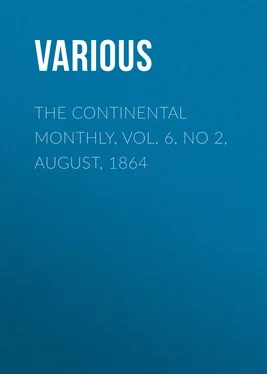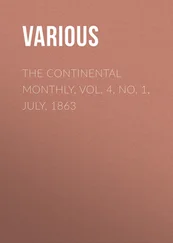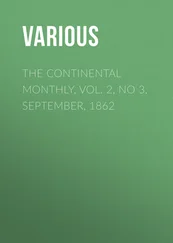Various - The Continental Monthly, Vol. 6, No 2, August, 1864
Здесь есть возможность читать онлайн «Various - The Continental Monthly, Vol. 6, No 2, August, 1864» — ознакомительный отрывок электронной книги совершенно бесплатно, а после прочтения отрывка купить полную версию. В некоторых случаях можно слушать аудио, скачать через торрент в формате fb2 и присутствует краткое содержание. Жанр: foreign_antique, periodic, Языкознание, Политика, foreign_edu, на английском языке. Описание произведения, (предисловие) а так же отзывы посетителей доступны на портале библиотеки ЛибКат.
- Название:The Continental Monthly, Vol. 6, No 2, August, 1864
- Автор:
- Жанр:
- Год:неизвестен
- ISBN:нет данных
- Рейтинг книги:4 / 5. Голосов: 1
-
Избранное:Добавить в избранное
- Отзывы:
-
Ваша оценка:
- 80
- 1
- 2
- 3
- 4
- 5
The Continental Monthly, Vol. 6, No 2, August, 1864: краткое содержание, описание и аннотация
Предлагаем к чтению аннотацию, описание, краткое содержание или предисловие (зависит от того, что написал сам автор книги «The Continental Monthly, Vol. 6, No 2, August, 1864»). Если вы не нашли необходимую информацию о книге — напишите в комментариях, мы постараемся отыскать её.
The Continental Monthly, Vol. 6, No 2, August, 1864 — читать онлайн ознакомительный отрывок
Ниже представлен текст книги, разбитый по страницам. Система сохранения места последней прочитанной страницы, позволяет с удобством читать онлайн бесплатно книгу «The Continental Monthly, Vol. 6, No 2, August, 1864», без необходимости каждый раз заново искать на чём Вы остановились. Поставьте закладку, и сможете в любой момент перейти на страницу, на которой закончили чтение.
Интервал:
Закладка:
The Times had now reached the pinnacle of prosperity, and its claims to be considered the foremost of journals were no longer disputed. The circulation of The Morning Chronicle had dwindled during the latter years of Perry's life, and after his death did not revive very much under Black, his successor. Brougham, Talfourd, and Alderson were among the writers in The Times , and Captain Sterling, whose vigorous, slashing articles first gained for The Times the title of the 'Thunderer,' was regularly engaged upon the staff at a salary of £2,000 a year and a small share in the profits. But the Government still steadily set its face against it, and in 1821 Mr. Hume loudly inveighed against the ministry in the House of Commons for not sending Government advertisements to The Times , instead of to other journals, which did not enjoy a tithe of its circulation. The arrangements of the post office were a great hinderance to the diffusion of newspapers, since the charge for the carriage of a daily journal was £12 14 s. , and for a weekly £2 4 s. a year. The number, therefore, that was sent abroad by this channel, either to the Continent or our own colonies, was very small. In 1810 the whole number thus despatched was but three hundred and eighty-three, and in 1817 it had fallen to two hundred and seventy-one, owing to the increase in the charges demanded by the post-office authorities, who were actually allowed to put the money in their own pockets; and in 1821 it was only two hundred and six. The circulation through the kingdom of Great Britain itself was not entirely free, inasmuch as every newspaper sent through the post office was charged for by weight, at an exorbitant rate, unless it was franked by a member of Parliament. This regulation continued in force until 1825, when an act was passed which provided that newspapers should be sent through the post free, on condition that they were open at both ends, and had no other writing upon the cover than the necessary address. At the same time the ridiculous acts which limited the size of newspapers were done away with, and every printer was henceforth permitted to print his journal upon any sized sheet he pleased. Two important concessions were also made to the press at this date, one in the House of Commons, and the other in the House of Lords. In the former, a portion of the strangers' gallery was set apart for the exclusive use of the reporters; and in the latter, reporters were permitted to be present for the first time. Previously to this, if any one had been rash enough to attempt to take any notes, an official would pounce upon him, and, with an air of offended dignity well befitting that august assembly, strike the offending pencil from his grasp!
In 1825, Joseph Hume attempted to get the stamp duty reduced on newspapers to twopence, and the advertisement duty to one shilling; and in 1827 he tried to gain an exemption from the stamp act for political pamphlets; but he was defeated on each occasion. In 1827, The Standard was started as a Tory organ, under the auspices of a knot of able writers, the chief of whom were Dr. Giffard, the editor, Alaric Attila Watts, and Dr. Maginn. It has always possessed a good connection among the Conservative party, but has never been a very profitable concern. After the abolition of the stamp duty its price was reduced to twopence, and in 1858 to one penny, and it was the first of the daily journals to offer a double sheet at that price. In recent times the Letters of 'Manhattan' have given an impulse to its circulation, from their novelty of style—an impulse which was probably further aided by the ridiculous but widely believed assertion that those letters had never crossed the Atlantic, but were penned beneath the shadow of St. Paul's.
The following statistics of newspapers in the chief countries of Europe in 1827, will probably prove interesting: France, with a population of—in round numbers—thirty-two millions, possessed 490 journals; the Germanic Confederation, with a population of thirteen millions, 305; Prussia, with a population of twelve millions, 288; Bavaria, with a population of four millions, 48; the Netherlands, with a population of six millions, 150; Sweden and Norway, with a population of four millions, 82; and Denmark, with a population of two millions, 80. Great Britain, with a population of twenty-three millions, far outstripped them all, for she boasted 483 newspapers; but was yet compelled to yield the palm to her Transatlantic kinsmen, for the United States, at the same date, with a population of twelve millions, circulated the unequalled number of 800. In looking at these figures, one cannot help being struck with the enormous disproportion between the journals of Roman Catholic and Protestant countries—a disproportion which is so significant that comment upon it is unnecessary. But the difference is still more plainly shown if we take two capitals. Rome, with a population of one hundred and fifty-four thousand, possessed only 3 newspapers, while Copenhagen, with a population of one hundred and nine thousand, enjoyed the advantage of having 53. The London papers were 100, the English provincial papers 225, the Irish papers 85, the Scotch 63, and the Welsh 10. The number of stamps issued was more than twenty-seven millions, of which London alone consumed more than fifteen millions; the number of advertisements was seven hundred and seventy thousand, of which London supplied nearly a half; and the amount of advertisement duty was £56,000, of which London contributed £22,000.
The year 1829 is remarkable for the first appearance of The Times with a double sheet, consisting of eight pages, or forty-eight columns. This great step in advance must have quite answered the expectations of its spirited proprietor, for in 1830 The Times paid to Government for stamps and advertisement duty no less than £70,000. The day of perfect freedom was beginning to dawn upon the press, although it took a quarter of a century to remove the last fetter, the stamp, and still longer, if we take into consideration the paper duty, which was removed in 1862. First came the abolition of the most oppressive portion of Lord Castlereagh's Six Acts, next the advertisement duties, and finally the stamp. The high price of the stamp, fourpence, kept the better journals at sevenpence, but a numerous class of unstamped journals at twopence sprang up in defiance of the law, and were allowed for a time to go on unchecked. They had a large circulation, one of them, The London Dispatch , attaining to twenty-five thousand a week. Growing bolder with their impunity, they indulged in the most abominable trash and the most frantic sedition and treason. They were of course prosecuted and punished, but they were never finally destroyed until the reduction of the stamp duty. They did good indirectly, for they formed one of the strongest arguments in favor of the abolition of that obnoxious impost.
In 1833 a battle royal raged between Daniel O'Connell and the press; but, as might have been expected, Dan was no match for the hydra-headed antagonist he had been rash enough to provoke. The quarrel originated in a complaint made by the Liberator of a misrepresentation of a speech of his, and he did this in so intemperate a manner that the reporters published a letter in The Times , in which they expressed their determination never again to report a speech of O'Connell's until he had apologized for the insults he had levelled at them. O'Connell vainly attempted to put the machinery of the House of Commons in motion against them, but, after repeated efforts, was obliged to give in. His attacks were principally levelled at The Times —which then counted among its contributors the brilliant names of Macaulay, Thackeray, and Disraeli—for he and John Walter were bitter foes. But he evoked several powerful defenders of the press, first and foremost among whom was Sir Robert Peel.
Читать дальшеИнтервал:
Закладка:
Похожие книги на «The Continental Monthly, Vol. 6, No 2, August, 1864»
Представляем Вашему вниманию похожие книги на «The Continental Monthly, Vol. 6, No 2, August, 1864» списком для выбора. Мы отобрали схожую по названию и смыслу литературу в надежде предоставить читателям больше вариантов отыскать новые, интересные, ещё непрочитанные произведения.
Обсуждение, отзывы о книге «The Continental Monthly, Vol. 6, No 2, August, 1864» и просто собственные мнения читателей. Оставьте ваши комментарии, напишите, что Вы думаете о произведении, его смысле или главных героях. Укажите что конкретно понравилось, а что нет, и почему Вы так считаете.












